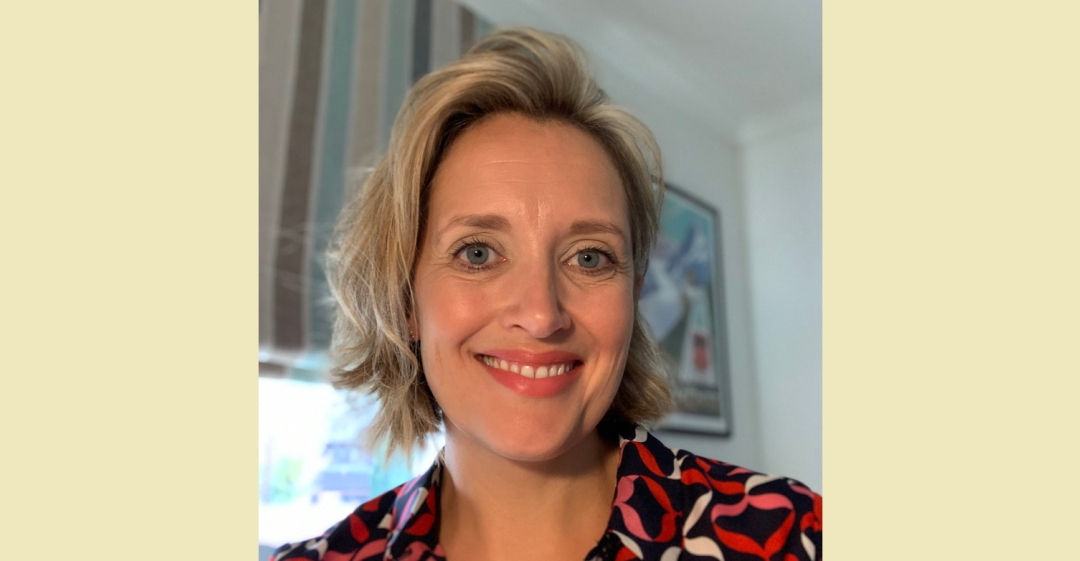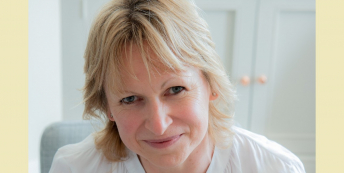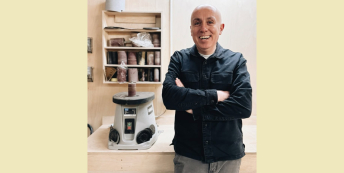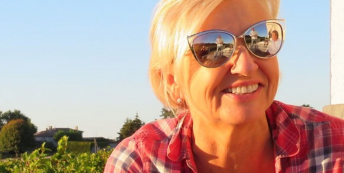“I was broadly comfortable, but it didn't fire me up anymore.”

What work were you doing previously?
I was the CEO of a charity working to support the Church of England.
My background is in fundraising.
What are you doing now?
I work as a Social Prescriber in Mental Health within the NHS in a GP surgery.
I work with patients who have severe and enduring mental health issues. I work with the medical teams to look at what else is affecting their life and is having an adverse affect on their mental health.
Together I spend time with the patient understanding what is going on and what solutions or options are available to help tackle some of these challenges. I'm meeting with some of the hardest patients in our surgeries but it's one of the most rewarding things I’ve ever done.
How did you feel in your work before you decided to make the change?
In some aspects it was comfortable.
Financially, it was well remunerated and I was broadly comfortable in terms of stretch and achievement, but it didn't fire me up anymore.
I was very much working to build an infrastructure on raising income, and whilst I could see some really good work going on in some of the churches I was there to support, I wasn't directly involved with the impact being made on the ground.
I found the whole time I held the role that I struggled to talk about it with family and friends. I found it very hard to say the title of my role, I didn't tell anyone I'd been promoted to the chief executive because I felt like a bit of an imposter and never quite felt like I'd ever 'fill the boots'.
Why did you change?
I took on the role of CEO when I had two young children and I went through both their young years doing this very pressured job.
I looked back over the notes from my shift and what was most frightening was a list of issues I had on my phone that I took to my GP, nine months before I resigned. I had a lot of physical health conditions.
I wanted and needed something to change.
How did you choose your new career?
I joined the Career Change Launch Pad, and there was a lot of testing things out.
An exercise during the Launch Pad helped to give me a shape of my areas of interest, and also highlighted to me how cut off I was from things that really engaged me.
I think I'd become so molded by the job that I wasn't really in tune with or in touch with what fired me up anymore. So the exercise helped me get back in touch with who I was.
I also found informational interviews extremely helpful. Even though they're meant to be only about 30 min max I had one that lasted four and a half hours!
It was brilliant and it actually put to bed an idea that I'd fantasized about for years, it was so useful just to knock it on the head.There was a sense of relief that I hadn't gone down the wrong path or locked myself into only looking at something that would use my transferable skills rather than something new.
I’ve also since become firm friends with the lady I had the chat with.
I felt like I needed to experience what it’s like to be in a different work setting, so I applied to be an exam invigilator at a massive secondary school local to me.
It was a great opportunity to see another organization in operation, see what works well, notice its pitfalls, and to be around the students. It was enough to be immersed in something totally different, but this was an experiment and not something I wanted to do long-term.
My mum is a marriage guidance counsellor and it's something I've always been very interested in. So after the Launch Pad I went on a short weekend course about counselling which led to me doing the Certificate in Counselling (foundation year), which I’m doing at the moment.
I’ve since applied to do the diploma course to become a fully trained Psychodynamic Counsellor and await the outcome.
Are you happy with the change?
Yes, in many ways it’s been transformational.
Though don't get me wrong, my work now isn’t a bed of roses!
Some of the people that I meet in this job feel so broken and have never had jobs let alone careers. It’s made me really take stock and realise just how fortunate I am to even be considering a career change.
It feels very humbling to walk with them as they face some of the traumas that they've faced in their lives. Some of the steps we're taking are really small steps but they're making big changes and I come home on occasion grinning from ear to ear on the small but crucial shifts I see in them.
Part of why I took this role as a Social Prescriber is to help with my longer term career change goals. Alongside the job, I'm training to be a psychodynamic counsellor, which is a five-year journey (although this is going to need to be privately funded).
This job provides me with a salary, but it also crucially gives me experience and exposure in dealing with people in distress. It’s helping me start to form ideas around what type of patient or individual I might want to focus on in the future.
It's had a positive impact on my homelife too. I have two young children and was virtually full time when I was CEO. Back then my daughter always wanted to walk somebody else's dog but due to my job I didn’t have the space or time to do that.
Once I left I joined 'Borrow My Doggy' and was able to do that with her. It might sound ridiculous but it made me feel 110% better that I was able to have that time with her.
One of my biggest concerns was how we were going to afford my shift. When we looked at this challenge as a couple, we knew I couldn't resign until my husband had got a higher paid position. It was only once that was secured that I resigned.
Now, three years on even though I earn a third of what I used to earn, we are broadly in the same financial position, given that we now don’t pay for before and after school care, additional house cleaning services etc.
How did you go about making the shift?
My career change journey (in terms of thinking about wanting to change) started when I was on maternity leave with my second child.
It wasn't until about four years later that I actually left the organisation that I'd established and run for twelve years.
After I left, I took a freelance contract to see if that would be better but it only confirmed that I really didn't want to be in that area of work anymore.
About a year after leaving my organisation I joined the Launch Pad.
The course was instrumental in helping me get over the hurdle of going from being a chief executive of an organisation with an annual turnover of £60m to suddenly going to what would be seen as lower-tier jobs. That was quite a leap.
I applied for and went into my current job quite quickly after the Launch Pad.
How did you develop (or transfer) the skills you needed for your new role?
In terms of being able to position myself for the role, I think I have a salesperson side to me with regards to my fundraising background.
They hadn’t had a social prescriber in their GP practice before and so I showed I was able to pick up things, run programs and make connections. I used the growth evidence I had from developing a charity from scratch, so there were transferable skills in that sense.
However I think I had a shortage of skills when I started the role in terms of working with people with severe mental health issues. I think they should have required more experience because of the seriousness of how ill some of the patients are, so it's been a steep learning curve!
How did you handle your finances to make your shift possible?
I made the shift in a planned and considered way.
My husband and I planned it so I could have a year to adjust and spend time supporting our youngest start school. Prior to me leaving we tried to save as much as we could to enable me to have that year, so there was some sacrifice from quite a long way out before I actually left.
I know that everyone's financial situation is different and unique, but it's amazing what you can do without if it’s worth the sacrifice for a better role and work-life balance.
What was the most difficult thing about changing?
It was a mental obstacle over wondering what others believed or perceived to be why I'd left a CEO role to go for something very different.
Overcoming any preconceptions they might have of me, like 'I bet she was fired', 'I wondered if she was bad at the job', or ‘she left because she couldn’t hack it’.
Time and getting more distance from my old job helped enormously.
In practical terms, the handover of the job and how I left the organization was really important to me. So I resigned with six months notice even though I only needed to give two.
We were coming out of Covid and I'd already delayed resigning because of the uncertainty of the situation, but didn’t feel I could leave with only two months' notice.
What have you learnt in the process?
The biggest lesson for me has been in getting to know what are the common themes that are my biggest challenges, and one of them is organisation skills.
I'm dyslexic so I've always struggled with prioritising tasks, and being organised has always been a challenge. What I've noticed is that it's still a problem even in a lower-paid job or as an exam invigilator. It doesn't matter what context I’m in, these are still problem areas for me.
I used to put it down to the job but actually any organisational aspect will always be a difficulty wherever I am.
What would you advise others to do in the same situation?
Get to know yourself.
When we are unhappy in any situation we often blame or find fault with external features whether they be colleagues, work place, commute, culture etc. Reflect first and notice patterns about yourself such as what energises you and what drains you.
Alongside the practicalities of a shift, there could be some inner stuff that you need to work on.
Give yourself space to be a bit more introspective and look at the common themes that trip you up, then tackle those. I think any period of transition or a change is when we do our best bit of learning about ourselves.
I've always stood by this quote by George Eliott, 'It is never too late to be what you might have been'. I knew I wasn't being the me that I wanted or needed to be. I'm not there yet but I'm on the way.
Helen took part in our Career Change Launch Pad. If you're ready to join a group of bright, motivated career changers on a structured programme to help you find more fulfilling work, you can find out more here.
What lessons could you take from Helen's story to use in your own career change? Let us know in the comments below.



